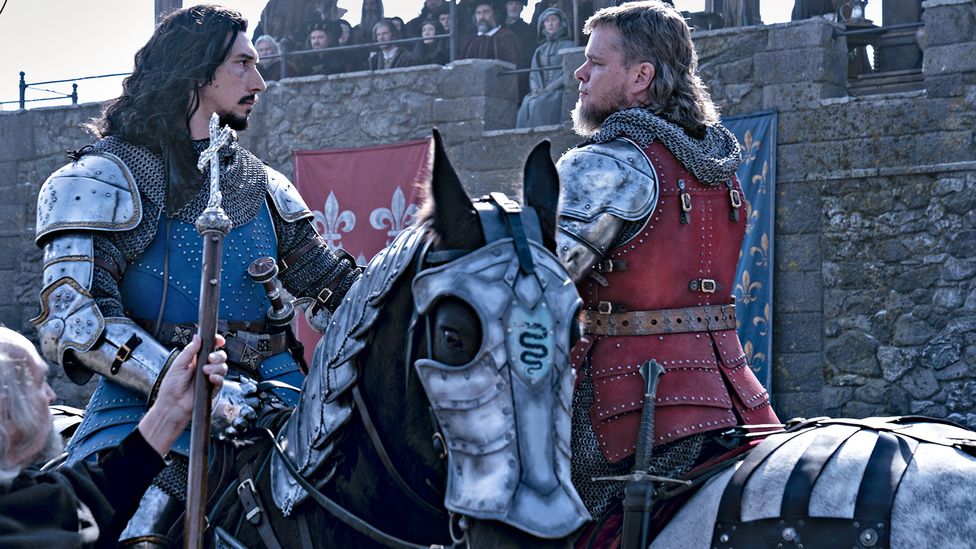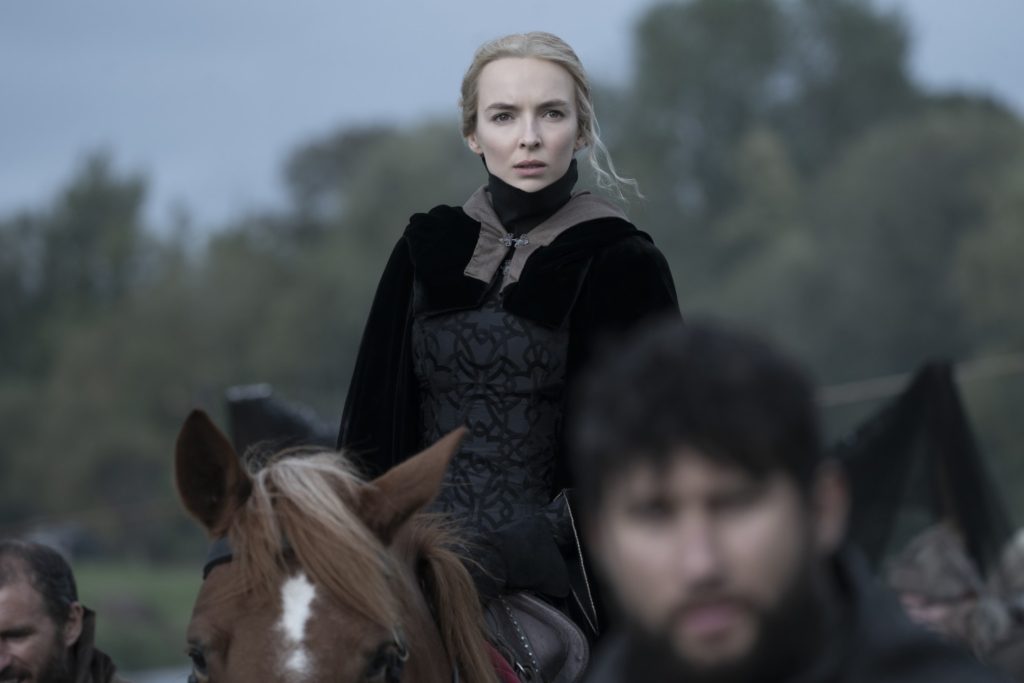
Based on accounts of the last medieval trial by combat, The Last Duel is both a thriller and a thinker. Director Ridley Scott (Alien, Blade Runner, Thelma & Louise, Gladiator, The Martian) brings alive medieval superstition and savagery, and embeds an exploration of the power dynamics within feudal society, especially for women.
The setting is France in the 1380s. Jean (Matt Damon) and Jacques (Adam Driver) have been born into the nobility as squires, which means that they serve as mounted, armored warriors and can own land and castles supported by their very own peasants. Jean is later promoted to the higher title of knight. That puts Jean and Jacques in the elite one percent, but they are totally subservient to the region’s count, Pierre (Ben Affleck), who in turn owes the same absolute fealty to King Charles VI (check him out on Wikipedia).
Jean is an impressive fighter, but not very strategic. He’s a dunderhead, devoid of any social or political skill. Jean has married the beautiful and intelligent aristocrat Marguerite (Jodie Comer), whose father had fallen out of royal favor. Try as she might, Marguerite is only moderately successful in helping Jean from bulling his way through life’s china shop.
Jacques is a canny smoothy, with a rare business sense and charm that melts the ladies. Those financial smarts, along with his appreciation for culture, makes Jacques a protege of Pierre, the count. Pierre favors favors Jacques over Jean, who resents it.
Finding Marguerite alone at home, Jacques rapes her. When Marguerite accuses him, Jacques denies it. Jean presses the case, which culminates in the film’s titular trial by combat.
Ridley Scott tells the story first from Jean’s point of view, then from Jacques’ and, finally, from Margeurite’s. Unlike in Rashomon, the three versions of what occurred don’t diverge much from each other. Instead, we see how Jean and Jacques, who both adhere to the code of their class, see themselves. Jean really thinks that he is a good husband. Jacques, although he has forced himself on Marguerite without her consent, really doesn’t think he has committed rape. (They have their Code of Chivalry, but it sure isn’t very chivalrous.)

We learn that, in 1300s European legality, rape wasn’t even a violent crime against the woman, but was a property crime against her guardian; (she was essentially the property of her father or husband). Ridley Scott slyly emphasizes this when he shows Jean’s reaction to an equine assault on his favorite breeding mare.
Margeurite’s insistence on bringing the rape charge publicly is a major problem for both Jean and for Jacques. It’s also an annoying inconvenience for the count, the king and the Church, who would sweep it under the rug. Jean thinks that he cleverly found away around the cover-up, but he overlooks one disturbing factor – if he dies in the duel, Marguerite will be immediately burned at the stake.
The performances by Comer, Driver, Damon and Affleck are all excellent. Harriet Walker is very good as Jean’s mother, a role which seems at first like a stereotypical stereotypical shrewish mother-in-law, until we learn of her own complicated journey navigating a world where men are unaccountable.
Scott shows us some savage medieval battles to prepare us for the final duel. Warfare at the time was desperate and brutal hand-to-hand butchery, within a sword’s length, like fighting in a phone booth. To stab, slash or impale an opponent, a combatant needed to find an unarmored body part. The jousting in The Last Duel seems especially authentic.
The Wife didn’t want to accompany me when I described it as the “medieval rape movie”; I should have said it’s the “trial by combat movie”.
I was late to The Last Duel, catching up with it several months after its summer 2021 release. Due to the distributor’s blustery publicity campaign, I had underestimated it; it’s one of the Best Movies of 2021, The Last Duel is streaming from Amazon, AppleTV, Vudu, YouTube, HBO and redbox.
